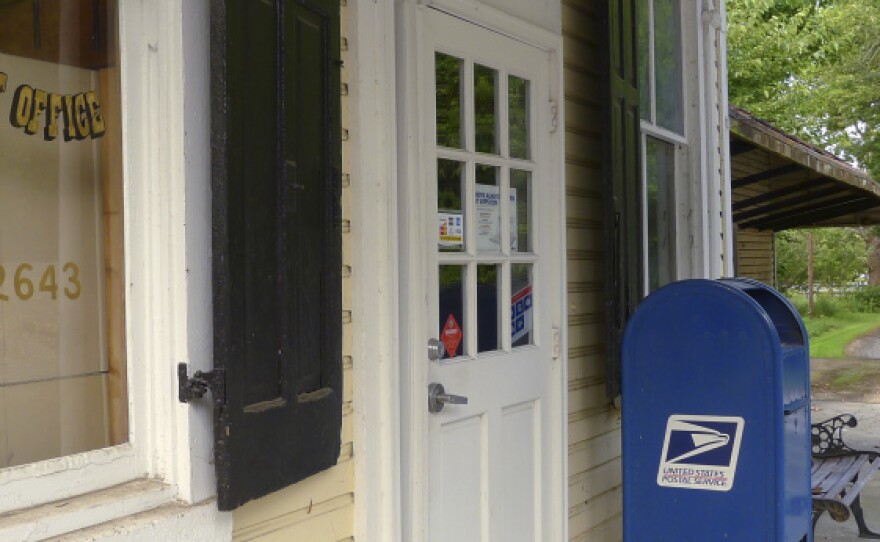More than half a million people work for the U.S. Postal Service making it the seventh largest employer in the world. But like a lot of other businesses, this one is being hit hard by the tough economy and transformed by the Internet.
Just in the last four years, mail volume is down 20 percent, so the agency is struggling to reinvent itself. But change isn't easy. Postmaster General Patrick Donahoe went to Congress to ask for help. His plan, which has been endorsed by President Obama, could mean layoffs, post office closings and the end of Saturday delivery.

Republican Rep. Darrell Issa of California blames the leaders of the Postal Service for its problems and wants the service to be under tighter controls. He says the agency's $15 billion in debt — its credit limit — is a sign that they have "more than a small cash-flow problem."
Issa's plan would create a "control board" that could, among other things, renegotiate union contracts. Democratic Sen. Tom Carper of Delaware, who chairs the Senate subcommittee that oversees the Postal Service, agrees that there's a problem with the Postal Service, but the solution he's proposing is very different.
"Part of what we need to do is to enable the Postal Service to take the steps that are appropriate [and] right-size their enterprise for the 21st century, much like the auto industry did a couple of years ago," Carper told Rachel Martin, guest host of weekends on All Things Considered.
One of the Postal Service's current complications is 2006 legislation that says the agency must set aside $5 billion to $6 billion a year to have on hand to pay for health benefits for retiring employees. Carper says almost no state or local governments — and very few private companies — do that.
Carper says the Postal Service may have overpaid into its pension plans — and he wants to see that money used to fund the retiree health benefits.
"The money could be drawn down from one of the overpayments and used over a number of years to prepay retiree health benefits for pensioners," Carper says.
Either way, Carper says, the Postal Service cannot continue to do business as usual.
Thinking Globally
So are there other models that might work for a retooled U.S. Postal Service? James Campbell, co-editor of the Handbook of Worldwide Postal Reform, says yes.
"In general, other countries have looked at this situation and decided [they] have to allow the post office to become more commercial and make them become commercial," Campbell says.
He cites postal systems in Germany, Sweden and New Zealand that have allowed their post offices to become more profitable, more commercial and more customer-oriented in order to survive.
Germany in particular has rethought its transportation network, sorting systems and has expanded globally. In 2002, Deutsche Post, Germany's postal service, bought a leading international transportation company, DHL.
"Their view is that the express business and package business is a global business," Campbell says.
The U.S. Postal Service is beginning to act more commercial through partnerships with FedEx and UPS, Campbell says. It's a natural partnership because FedEx has an excellent collection system, while the Postal Service has a great household delivery system.
Post offices are another area where other countries have streamlined. In countries like Britain or Germany, there are very few traditional post offices. Almost all post offices are operated by small businesses or retail stores.
"They find that they wind up providing better service [and] longer hours at lower cost by this sort of a system," he says. "It's possible to imagine in the U.S. that the post office adapts and transforms into another useful, important operation — but it's not going to be a carrier of letters and sentiments."
The Rural Post
Though trimming the number of post offices in the U.S. might save the Postal Service money, the loss could be felt in other ways.

Tom Gamble has been a mail carrier 24 years. He works a route in Youngstown, Ohio. Gamble is also the president of the state's Association of Rural Letter Carriers.
Gamble says the loss of post offices in rural communities would have a devastating effect there.
"There are a lot of people in the rural community that rely heavily on the post office," Gamble says, "we carry feed, livestock, seed — a lot of things that the rural community depends on."
Gamble has delivered everything from baby chickens to rabbits and even crickets to rural customers. He says for some folks in rural communities the postal carrier might be the only person they see for weeks.
"There are countless stories of carriers that have been looking out for some of their older customers and saved the lives of customers because their mail started to build up the mailbox," he says. "We kind of keep an eye on the neighborhoods."
Gamble says as the Postal Service evolves and the pressure builds to do more in less time, carriers have less time to communicate with their customers. He says he feels like he's part of the family with some customers, but that could all start to change.
"I know who's in trouble and who's not, just by the mail that comes out. I know who's having a birthday and who's lost a loved one," he says. "You just can't replace those kinds of things."
Copyright 2022 NPR. To see more, visit https://www.npr.org. 9(MDAzMjM2NDYzMDEyMzc1Njk5NjAxNzY3OQ001))






